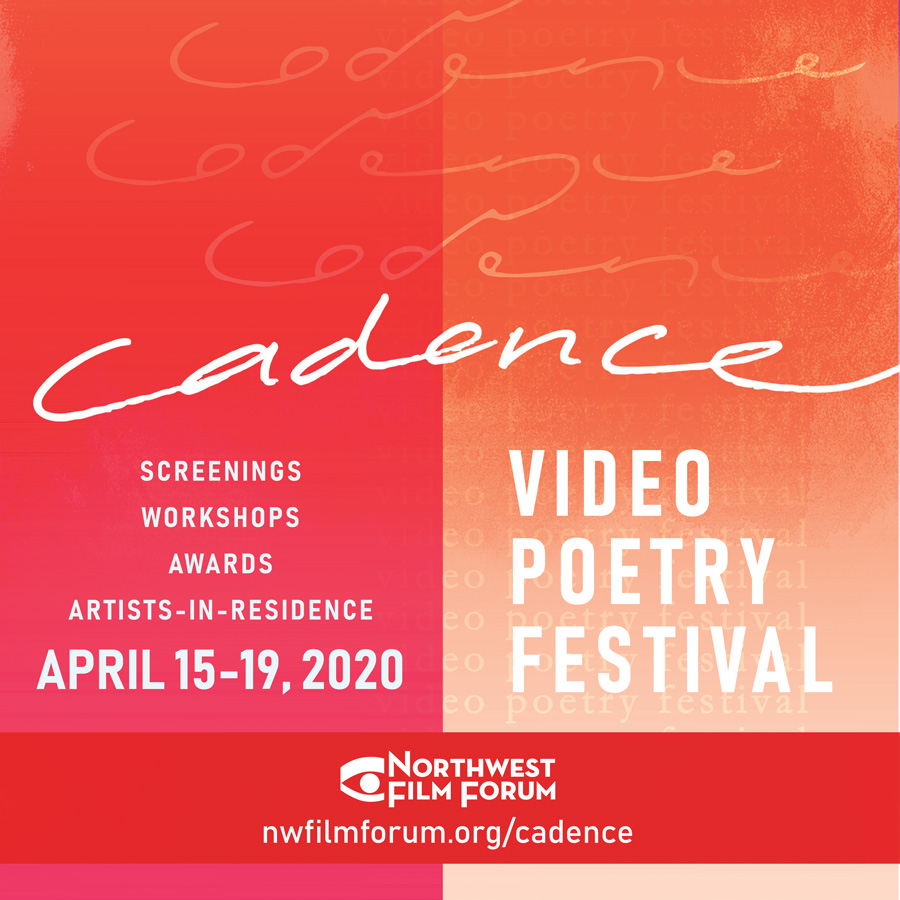Cadence 2020 – Better Left Unsaid: Video Poetry Showcase [Online]
Sliding scale admission: $0–25
Please pay what you can; proceeds support our move to a virtual platform!
Each showcase will be available to view for 24 hrs from the listed showtime (PDT).
Cadence is SCREENING ONLINE! NWFF’s physical space is temporarily closed in light of public health concerns around COVID-19, but community, dialogue, and education through media arts WILL persist.
• • HOW TO WATCH • •
- Purchase a ticket through Brown Paper Tickets in advance of the listed showtime (PDT). Registration ends 1 hour before the start time.
- 30 minutes before each screening, NWFF will send a link and password to your registered e-mail address! (Don’t see it? Check your spam filter.) The password will expire at the end of the 24 hr screening window. No late seating!
- If by showtime you do not receive an e-mail with details, please contact rana@nwfilmforum.org for a quick follow-up. (But please, check your spam!)
About
Not silent, these video poems emphasize language as an auditory experience, a graphic experience, and a cultural experience. A dying language left untranslated, constraints leaving language limited, and limited language leaving emotional threads through found and filmed footage—this screening leaves room for inference and poetic impressions.
Cadence: Video Poetry Festival, presented by Northwest Film Forum, programmed in collaboration with Seattle author Chelsea Werner-Jatzke and artist Rana San, is a series of screenings, workshops, and discussions on the genre of video poetry, throughout National Poetry Month. Cadence fosters critical and creative growth around the medium of video poetry, approaching it as a literary genre presented as visual media.
Image Credit: der und die by Peter Böving
Short Film Program:

Sara Kei
(Kamyar Mohsenin & Sara Kei, Seattle, WA, 1 min)
Written and conceptualized by Sara Kei directed and edited by Kamyar Mohsenin.

How Do They Do It?
(A. Moon, US, 2019, 5 min)
This silent found footage film uses mundane moments culled from a trove of vintage “adult” films found at a Baltimore salvage house and the structure of a half-forgotten poem to mine meaning and examine agency, motivation, and the limited nature of possibilities in a familiar genre of filmmaking.

der und die (Blind Date in Dresden)
(Peter Böving, Germany, 2019, 10 min)
A love poem by Ernst Jandl is the basis for a musical “Tête-à-tête” between a Dresden woman and a Martian. In a rental car it comes fast to a rushing love scene, which ends in total chaos in the environment of a violent Monday demo.

An A4 paper
(Cheng Qiu, UK, 2018, 2 min)
An experimental animation from a poem I wrote —— ‘A monologue of an A4 paper’.

With Air and Salt, Unbreakable Health
(Maia Iotzova, Canada, 2018, 7 min)

FOG HORNS
(Ebba Jahn, Germany, 2020, 6 min)

Where Does It Hurt?
(Tara Morgan, Vashon, WA, 2020, 1 min)
Heartbreak/Intake, stop motion + poetry.

future perfect
(Ian Gibbins, Australia, 2019, 5 min)
Words stripped of their ornamentation, pared back to monosyllabic cores… Are these the roots of language? Or are they the skeletal remains of a lost form of communication?

Exordium
(Laura Knott & Kevin McLellan, US, 2019, 10 min)
On a winter night in Cambridge, Massachusetts, seven friends gather to share food and company. There are 7.7 billion ways to dine. This is one of them.

It is time to give yourself flowers
(Maria Meldgaard, Denmark, 2019, 2 min)
A message of self love and intimacy that comes from a place of need, and at times from force.

Haiku
(Martin Gerigk, Germany, 2020, 17 min)
Haiku | 俳句 is a symphonic audiovisual project for two Japanese performers, alternating percussion groups, soundscapes and rhythmicized video sequences. The film is an experimental approach to pay tribute to the extraordinary art of Japanese haiku poetry.
Back to Festival Catalog:
Cadence: Video Poetry Festival [Online]
Cadence, the only festival dedicated to video poetry in the PNW, fosters critical and creative growth around its genre. This year we will host five online showcases of short video poetry works by 83 artists from 20 different countries, selected from an open call for submissions and solicitations. In 2020, Cadence is moving online for the first time, in response to Washington State’s Stay Home, Stay Safe mandate. All programs priced on a sliding scale.
